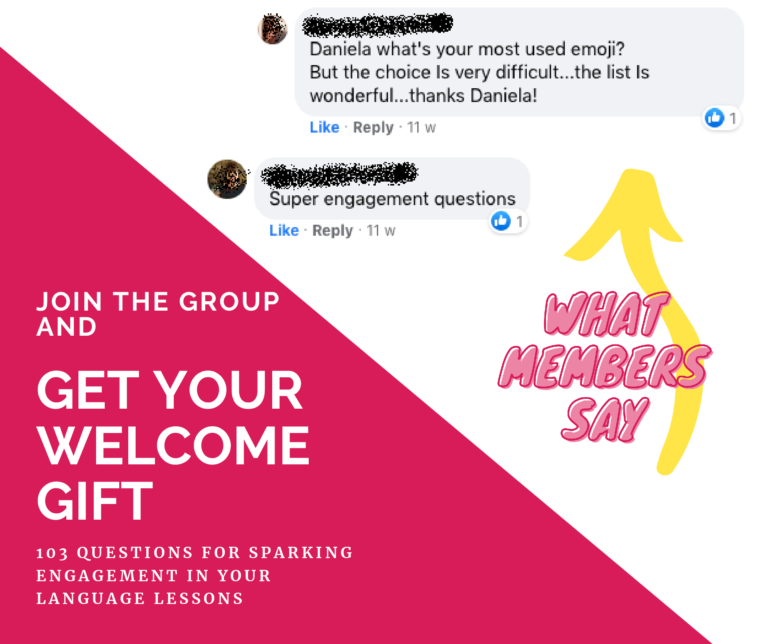
This post is dedicated to all teachers teaching English to adults, as well as to all teachers teaching any other language to adults. By adults usually we mean students aged 16+. The main challenge with this age group is to reach their motivational driver. For this article I would like to keep apart “grandpa” motivation. Instead, I would like to debunk 3 myths about teaching languages to adults and to provide you with an alternative approach to teaching to adults.
The 3 guidelines for teaching English to adults (and for teaching any other target language, too) crystallize my personal experience as a Learning & Development specialist, organisational trainer and language teacher. I have been training hundreds of people over the last 15 years. Of those hundreds of people, the great majority of them are adults: from university students to professionals, to entrepreneurs and freelancers, to managers, and so on. In this article I go through 3 things I keep on teaching teachers who deal with adult students.
Three myths about teaching English to adults
In my experience, I came across 3 myths about adult learning and teaching adults:
- Adults want serious training
- Adults are well aware about their strengths and weaknesses and know what they need to learn
- Adults are self-efficient and don’t need much help for achieving results.
In my view, none of the above is genuinely true. I’m going to explain why.
The three myths about teaching English to adults debunked
Beyond serious training
Adults love playful activities and having fun while they are learning. I always begin all my training courses with ice-breaking games with the precise goal to create a pleasant and relaxed atmosphere in the training room. During the training, I always propose games and fun activities to keep the students’ learning barriers out of the way.
This doesn’t mean the training is less effective. On the contrary, planning lessons packed with games and fun exercises indeed facilitates the acquisition of the target language. The main reason why we, language teachers, want to implement playful training is that we know playing games and using art in the language lessons contribute to making the students feel at ease and relaxed. That frame of mind is essential for facilitating the acquisition of new input.
That explained, the first guideline for teaching English to adults is: always plan your lessons packed with language games, playful activities and ice-breakers.
Don’t be afraid of proposing games to adult students, not even if they are senior students. Also, dare to use games and art in formal training, too: just make sure to pick suitable games and activities considering the training setting. Remember: even CEOs are people, after all! And in your classroom they are students wishing to enjoy learning the target language. Allow them to enjoy themselves, then.
They know it, but you know it better
Time ago I went to my yoga teacher because I had a terrible back-pain. I thought I’d have done exercises for the back. With my great surprise, she invited me do some exercises with the legs, instead. She explained to me sometimes, to fix a problem affecting a painful area of the body, we need to start from the opposite point.
Adults think they know what they need to learn, whereas very often their belief doesn’t reflects the reality. Since adults have experience as learners, they are able to reflect on their own experience and to draw conclusions. For instance: “I learn better watching videos.” or “I need to revise the conjugations of the verbs.” or “I need to do practice this piece of grammar”. I might hear your students saying things like those ones, right?
The point is you are the teacher and you have the knowledge, the skills and the tools to assess their needs. Although it’s important to listen to their perceived needs, it’s even more important you are able to carry out your own objective analysis and to act consequently. Just like my yoga teacher did with me.
Hence, the second guideline for teaching English to adults is: acknowledge their point of view on what they need to learn, but then work on what you see they need to improve. You are the expert in language acquisition.
This is about finding a delicate balance between listening to their ideas and addressing their efforts towards the type of work we know would be beneficial to them.
Adults love having a plan
Adults love leadership: they are available for stepping out of their comfort zone as long as they see a capable guide in you. This is about the difference between being a coach versus being a teacher.
A coach has got a roadmap and s/he is able to walk the students through the steps of the roadmap. Adult students still need clear instructions from someone who can tell them what to do to achieve the expected results.
Practically speaking, the third guideline for teaching English to adults is: at the beginning of your courses, show them the roadmap of the journey with you. That will be the programme, the expected results, the timing. Also, tell them more about the how they are going to get there (aka the method). Furthermore, remember to show them testimonials and feedback by your former students who benefited from your lessons. This will establish even more your leadership as a guide. They need to trust you as their guide in this journey.
Wrapping up
Fun, objective analysis and plan. These are the 3 keywords condensing the 3 guidelines for teaching English to adults, as well as for teaching any other foreign language to adult students.
Regardless of the professional, educational, social background or the specific age group of your adult students, they all have a brain and all brains work in a similar way when it comes to language acquisition.
Hope the guidelines will help you in your next lessons. Good luck!
Want more support?
Join the Facebook group Independent Language Teachers Collective to get daily advice, tons of free training and to branch out with other independent language teachers like you!
ALSO…
Available only for the Collective members: free list 103 question for sparking engagement in your language lessons.
This is what members say about the freebie:

Join in the Collective and grab your welcome gift:


